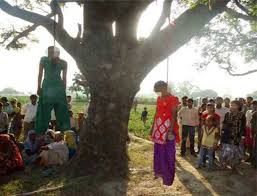Two teenage Indian girls found hanging from a tree in May took their own lives and were not gang-raped and murdered, federal investigators have said.
The announcement came after months of inquiry by the Central Bureau of Investigation following global outrage.
Three men arrested in connection with the case in northern Uttar Pradesh state were freed on bail in September.
It is unclear why the girls might have taken their lives. Correspondents say there are many unanswered questions.
Women’s rights activists say they are not happy with the latest findings and are urging the CBI to continue investigating.
The lower-caste cousins, thought to have been 14 and 15, were found hanged from a mango tree in Badaun district on 28 May.
The fact that there has been little explanation about the motive has led many people to question the findings of the CBI.
“CBI has tried to fudge the case and save the accused from the very beginning,” Sohan Lal, father of one of the girls, told BBC Hindi.
“I am very angry with their decision. The team did not show any promptness while investigating the case.”
‘Forty scientific reports’
The girls went missing after apparently going outside to relieve themselves during the night as they had no toilet at home.
A local post-mortem examination initially confirmed multiple sexual assaults and death due to hanging.
But forensic tests conducted since then have concluded the girls were not sexually assaulted, the Central Bureau of Investigation (CBI) said.
“Based on around 40 scientific reports the CBI has concluded that the two minor girls in the Badaun case had not been raped and murdered as had been alleged in the FIR [first information report],” CBI spokeswoman Kanchan Prasad said on Thursday.
“Investigation has concluded that it is a case of suicide.”
More details are due at a news conference later on Thursday.
Analysis: Geeta Pandey, BBC News, Delhi
The latest CBI revelations are baffling and many will not believe them.
It was initially believed that the two lower-caste girls were gang raped and hanged by young men from a slightly higher caste. A post-mortem carried out on the bodies by a team of three local doctors said the girls had injuries “suggestive of rape”.
In August, the CBI had the clothes, vaginal swabs and other personal effects of the girls and the three accused men tested – and came up with the startling revelation that the cousins had not been sexually assaulted at all.
It was also suggested the murders could be a case of “honour killing” by relatives. The CBI chief’s latest statement that the girls took their own lives “because of family pressure” over their friendship with a villager has added a further twist.
In just six months, there have been three different theories about how the teenagers died and each theory has raised more questions than it has answered. How the investigators arrived at a verdict of suicide is as yet unclear.
Indians are now beginning to wonder whether they will ever know what actually happened on the night the two girls brutally died.
Earlier, CBI chief Ranjit Sinha told the Hindustan Times newspaper they had “cracked the Badaun case”.
“The local police had erroneously conducted their probe along the lines that the sisters were killed,” he said.
Correspondents say the story of the hangings has become murkier and murkier over the past few months, with officials raising questions over the testimony of the victims’ families, accusing them of failing lie-detector tests.
Investigators also raised doubts about the credibility of the main witness, a neighbour of the girls, amid reports that he had been paid money by their families.
It also became clear that the CBI did not trust the original local police investigation.
In September a court bailed the three accused after federal investigators refused to charge them, citing a lack of evidence.
Two constables, who were also arrested along with the accused and charged with dereliction of duty and criminal conspiracy for not taking the parents’ complaint seriously, were also bailed in September.
Federal investigators have said the clothes and personal effects of the girls were examined by the Centre for DNA Fingerprinting and Diagnostics (CDFD) in Hyderabad and it found no proof of sexual assault.








